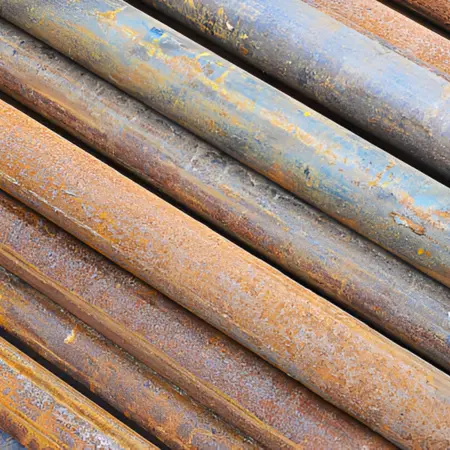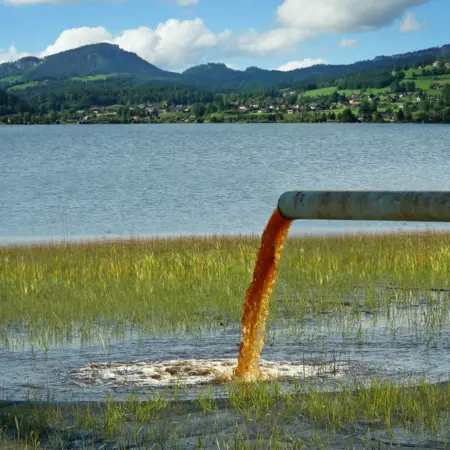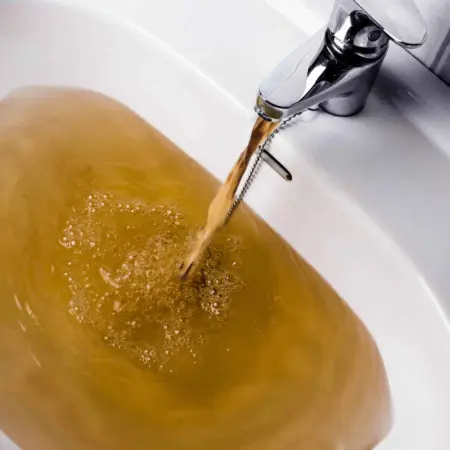Seeing brown hot water come out of your taps can be alarming!
It often means there’s rust and dirt in your pipes.
Don’t worry—understanding the causes can help you solve the problem quickly.
Key Takeaways
- Rust develops on metal pipes when exposed to moisture and oxygen for a long time.
- When the heater runs, dirt can mix in, leading to brown and cloudy water.
- This contamination can impact the quality of the water in your home.
- Plumbing work in your home or nearby can cause rust and sediment in the pipes.
- Flushing your water heater is an easy way to remove dirt buildup.
- If the corrosion is bad, replacing the old pipes with new ones is best.
- Checking water quality helps spot problems early, keeping the water safe and clean.
Common Causes Of Brown Hot Water
Several factors could be at play if you’re dealing with brown hot water.
Here are some common causes and what they mean for your water quality.
1. Rusty Pipes
Rust forms when metal pipes are exposed to moisture and oxygen over time.
This can happen in older plumbing systems made of iron and steel.
When the protective coating wears away, rust begins to develop.
Impact On Water Quality And Safety
When rust enters your water supply, it can make the water look brown and reddish.
Small amounts of rust are usually not harmful.
Yet, they can affect the taste and quality of your water, making it less safe to drink.

2. Sediment (Dirt) Buildup In The Water Heater
Water heaters can build up dirt over time.
This dirt consists of minerals like calcium and magnesium that settle at the bottom of the tank.
Over time, this buildup occurs more frequently in areas with hard water.
When the heater is on, the dirt can mix in, causing brown and cloudy water.
This dirt affects the water’s color, can impact its taste, and can make it less pleasant to use.
3. Corroded (Rust) Water Heater
If the water heater is rusted, you might notice rusty water, leaks, and a strange smell.
These are signs the unit may be wearing out and not functioning properly.
Results Of A Corroded Unit
A corroded water heater can cause major problems.
This includes lower efficiency and the risk of water damage.
Sometimes, it may need to be replaced entirely to ensure safe and clean water.
4. Contaminated (Polluted) Water Supply
Sometimes, the water can be contaminated by outside sources.
This can happen due to old pipes in the community and nearby construction.
This contamination can affect the quality of water coming into your home.

If the local plumbing system is old or damaged, rust and dirt can enter your water.
This can contaminate your water supply.
It leads to brown water and other quality issues.
5. Temporary Issues From Maintenance Or Repair
If plumbing work is done in your home or your area, it can cause rust and sediment in the pipes.
This might cause temporary brown water to flow from your taps.
Here are some common reasons leading to this issue:
- Pipe replacements
- Flushing the water heater
- Repairs to the main water line.
How To Fix Brown Hot Water Issues
If you’re dealing with brown hot water, there are several ways to address the problem.
Here’s how to fix it with DIY solutions, professional help, and steps to keep your water clean.
1. DIY Solutions
Here are DIY solutions to keep your water clean:
A. Flushing The Water Heater
Flushing your water heater is a simple way to remove sediment buildup.
To do this, turn off the heater and let it cool down.
Then, connect a garden pipe to the drain valve at the bottom of the tank.
Open the valve and let the water flow out until it runs clear.
This process helps remove any sediment that might be causing brown water.
B. Cleaning Or Replacing Corroded Pipes
If you think rust in your pipes is causing the brown water, you can clean or replace the damaged parts.
You can use a wire brush to clean the affected areas for minor rust.
If the corrosion is severe, replacing the old pipes with new ones might be best.
This will help ensure that your water supply stays clean.

2. When To Call A Professional
If flushing the water heater or cleaning pipes doesn’t solve the problem, it may be time to call a plumber.
Look for signs like constant brown water, leaks, or a strange smell from your faucets.
These can show more serious issues that need expert attention.
Here’s what to expect from a plumber:
When you call a plumber, they will inspect your plumbing system to identify the cause of the brown water.
They may check your water heater, pipes, and the main water supply.
After finding the problem, they will suggest solutions and give you a repair cost rate.
3. Preventive Measures
Here are some preventive measures to avoid brown water issues:
A. Regular Maintenance Tips For Water Heaters And Plumbing Systems
To prevent brown water in the future, perform regular maintenance on your water heater.
This includes flushing the tank at least once a year and checking for leaks or rust.
Additionally, inspect your pipes regularly and replace any that show signs of rust.
B. Importance Of Water Quality Testing And Monitoring
It’s also a good idea to test your water quality frequently.
You can buy water testing kits or have your water tested by a professional.
Monitoring water quality helps catch issues early, ensuring water stays safe and clean.
Contact us at OP Plumbing Hub for excellent services.
Conclusion
This article talks about common causes of brown water and how to fix them.
Brown hot water can be caused by rust, sediment buildup, or corroded pipes.
You can often fix these issues with simple DIY methods, but feel free to call a professional if necessary. Contact us at OP Plumbing Hub for expert help.
